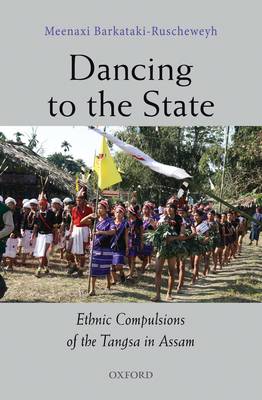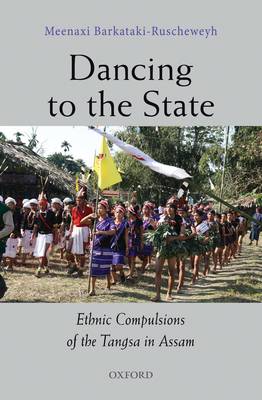
- Afhalen na 1 uur in een winkel met voorraad
- Gratis thuislevering in België vanaf € 30
- Ruim aanbod met 7 miljoen producten
- Afhalen na 1 uur in een winkel met voorraad
- Gratis thuislevering in België vanaf € 30
- Ruim aanbod met 7 miljoen producten
Zoeken
Dancing to the State
The Ethnic Compulsions of the Tangsa in Assam
Meenaxi Barkataki-Ruscheweyh
Hardcover | Engels
€ 56,95
+ 113 punten
Omschrijving
Can small indigenous communities survive, as distinct cultural entities, in northeast India, an area of mindboggling ethnic, linguistic and cultural diversity? What are the choices such communities have, and what are some of the strategies such communities use to resist marginalisation? In recent years, many such small groups are participating in large state sponsored ethnic festivals, and organising their own community festivals. But are these signs of their increasing agency or simply proof of their continued marginalisation? How do state policies and political borders -- inter-state as well as international -- impact on a community's need to perform their ethnicity? These are some of the questions that will be addressed in this work, on the basis of ethnographic field work conducted among the small Tangsa community living in Assam in northeast India. The study also reveals the asymmetry in the relations between the dominant power-wielding Assamese and the Tangsa. In summary, this is a study about marginality and its consequences, about performance of ethnicity at festivals as sites for both resistance and capitulation, and about the compulsions, imposed by the state and dominant neighbours, that can force small ethnic groups to contribute to their own marginalisation.
Specificaties
Betrokkenen
- Auteur(s):
- Uitgeverij:
Inhoud
- Aantal bladzijden:
- 384
- Taal:
- Engels
Eigenschappen
- Productcode (EAN):
- 9780199472598
- Verschijningsdatum:
- 29/08/2017
- Uitvoering:
- Hardcover
- Formaat:
- Genaaid
- Afmetingen:
- 147 mm x 221 mm
- Gewicht:
- 521 g

Alleen bij Standaard Boekhandel
+ 113 punten op je klantenkaart van Standaard Boekhandel
Beoordelingen
We publiceren alleen reviews die voldoen aan de voorwaarden voor reviews. Bekijk onze voorwaarden voor reviews.











